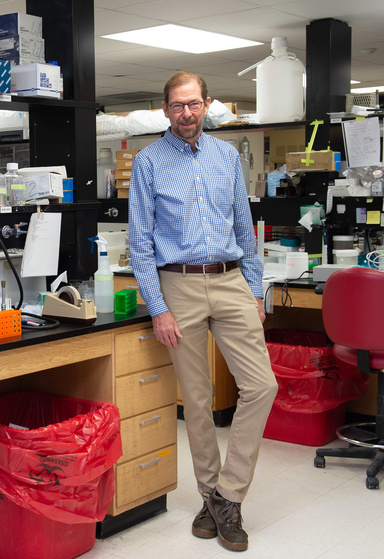
Inaugural collaborative research grant will fund new approach to develop targeted cystic fibrosis treatments
Researchers at University of Iowa Health Care, Children’s Hospital of Philadelphia (CHOP), and the University of Rochester School of Medicine and Dentistry, have been awarded $858,932 in collaborative grant funding from Emily’s Entourage to develop a novel approach for targeted cystic fibrosis therapies.
Paul McCray, Jr., MD, professor of pediatrics-pulmonary medicine at UI Health Care, will collaborate with Beverly Davidson, PhD, at CHOP, and John Lueck, PhD, at University of Rochester, to develop new viral vectors that can effectively target human airway cells and deliver cystic fibrosis (CF) therapies for the 10% of patients with CF mutations that do not respond to current treatments. Both Davidson and Lueck previously worked at UI Health Care.
Emily’s Entourage (EE) is a non-profit organization that accelerates research for new treatments and a cure for the final 10% of people with CF who do not benefit from existing CFTR modulators. The award is the first of EE’s Collaborative Grant program, a newly launched funding initiative to accelerate groundbreaking CF treatment research by bringing together multiple investigators with diverse areas of expertise to jointly tackle challenges in the development of novel CF therapeutics.
Targeting CF therapies
CF is a life-shortening genetic disease caused by mutations in the CFTR gene that affects the lungs, digestive system, and other organ systems. Despite significant advancements in CFTR modulator therapies, approximately 10% of individuals with CF still lack effective treatment options due to specific mutations, intolerance, or suboptimal response to existing medications.
The research team aims to enhance the delivery of emerging gene therapy and gene editing technologies that restore CFTR function in people with CF. The researchers will identify and test new variants of the gene-carrying vector called adeno-associated virus (AAV) that could be used to deliver these new treatments. By using new AAV capsid variants to address challenges like poor transduction efficiency, this approach has the potential to offer curative outcomes for people with CF who still lack effective treatments.
"We are honored to receive this generous grant from Emily’s Entourage, which will propel our research efforts towards developing more efficient and targeted treatments for cystic fibrosis," McCray says. "Our research aims to address the critical unmet need in CF treatment by improving how therapeutics are delivered to airway epithelial cells — an important step in advancing treatments for the final 10% of people with CF."
The project's two-fold objectives include finalizing the capsid screen to identify the most efficient variants for cargo delivery to human airway epithelia and assessing the efficacy of leading capsids for therapeutic cargo delivery.
"Emily’s Entourage is proud to support innovative research initiatives that explore new approaches to treating people with CF with the goal of reaching 100% of the community," said Chandra Ghose, chief scientific officer at Emily’s Entourage. "This inaugural award through our new Collaborative Grant program marks a significant milestone, underscoring our commitment to accelerating CF treatment breakthroughs and expediting the development of life-changing therapies for all individuals affected by this disease."